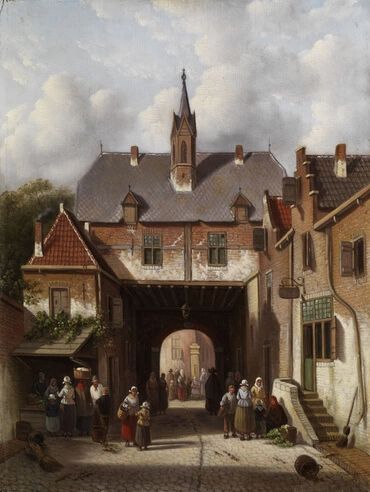คร่ำครวญ 1:15
Many thanks to Philip Pope for the permission to use his 2003 translation of the English King James Version Bible into Thai. Here's a link to the mission's website: www.thaipope.org
Gate

Gates" in ancient times had a significance that does not hold in the modern world. Cities then were enclosed by walls for protection; gates in the walls let people in and out to do their business, but were also the weak points in the cities' defenses. In the Bible, cities on one level represent the minds of individual people. On a broader level, they represent beliefs shared by a community. The gates, then, represent openings where the Lord can feed us an understanding of truth and a desire for good. They also represent points where the hells can invade and sway us with false ideas and evil desires. We are kept in balance during our lifetimes, with influences from both the Lord and from hell. Ideally, we will over our lifetimes continue to invite the Lord farther and farther in and drive the hells back until ultimately the Lord can occupy our minds completely. And that point our belief in Him and His power and love will hold the gates and deny evil any entrance. As individuals, we at that point become angels. As communities, we at that point become part of the Lord's church. And at that point the gates become an entry point, introductory truths that allow people to enter churches and start bringing the Lord into their lives.
Arcana Coelestia # 2606
2606. In former times the Old Testament Word used to be called The Law and The Prophets, the Law being used to mean all the historical narratives, which are the five books of Moses and the books of Joshua, Judges, Samuel, and Kings, 1 and the term Prophetical to mean all the prophetical utterances, which are the books of Isaiah, Jeremiah, Ezekiel, Daniel, 2 Hosea, Joel, Amos, Obadiah, Jonah, Micah, Nahum, Habakkuk, Zephaniah, Haggai, Zechariah, and Malachi. There were also the Psalms of David. The historical sections of the Word are also referred to as 'Moses', and therefore the expression 'Moses and the Prophets' is used in various places instead of the Law and the Prophets, while the Prophetical parts are referred to as 'Elijah'. See the Preface to Genesis 18.
Poznámky pod čarou:
1. In the Hebrew Bible Joshua, Judges, Samuel, and Kings are entitled The Former Prophets.
2. In the Hebrew Bible Daniel does not occur among The Latter Prophets but in a section known as The Writings.






